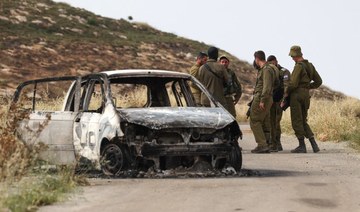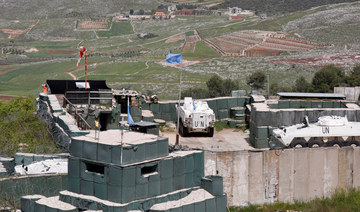RAMALLAH: Palestinian activists and political leaders have accused Israeli authorities of waging war on Palestinian education in East Jerusalem.
They have condemned what they termed as the Israelization of the Palestinian-taught curriculum after the Israeli Knesset approved two bills to increase supervision over schools in the Palestinian community in occupied East Jerusalem and inside Israel, where 1.7 million Palestinians live.
Palestinians see a deepening involvement of the Israeli intelligence service — known as the Shin Bet — in scrutinizing the activities of Palestinian teachers and facilitating their dismissal under the claim that they are associated with activities against the Israeli occupation and its repressive practices and apartheid policy.
Ahmed Ghunaim, a prominent leader in the Fatah movement in East Jerusalem, told Arab News that Israel was trying to erase Palestinian identity, history, and culture from the education curriculum. Now, he said Israel was targeting the teachers themselves.
The Israeli occupation, he told Arab News, realizes the importance of Palestinian identity and the efforts to keep it alive from generation to generation. It is thus working to weaken this identity that unites Palestinians in East Jerusalem, the West Bank, the Gaza Strip, and the diaspora.
“Israel wants to force the Palestinians to accept the Judaization and Israelization of knowledge and education, and this will not succeed,” he added.
The Palestinian Ministry of Foreign Affairs condemned the Israeli Knesset’s adoption of the new laws.
It hit out at Israel for intensifying its restrictive measures against teachers and students, citing moves to grant licenses to schools teaching an Israeli curriculum and to facilitate the filing of charges against any student, teacher or educational administrator alleged to have violated the laws.
In a statement issued on Thursday, the ministry said it was looking very seriously at the consequences of these racist laws, which would legitimize the persecution of Palestinians.
“The attempt to control the consciousness of generations and push them to accept the procedures and measures of the occupation is clear,” the ministry said, adding that the moves constitute “a flagrant violation of international law.”
The ministry called on international organizations concerned with human rights to raise their voices and intervene urgently to block these laws from being enacted.
The laws, it says, violate the citizen’s right, under the Universal Declaration of Human Rights, to adhere to his or her identity and practice freedom of thought and speech through peaceful and educational means.
The bill stipulating stricter criteria for granting a teaching license, submitted by M.K. Amit Halevy of the Likud party, was supported by 45 Knesset members and opposed by 25.
The draft law — introduced as an amendment to the Schools Supervision Law — seeks to oblige the Ministry of Education to check any Palestinian candidate’s “security background” for a teaching job.
Also, granting a teaching license requires that the candidate has “no security history or connection to the execution of a terrorist act.”
The draft law requires the director-general of the Ministry of Education to revoke the approval of the appointment of a teacher “convicted of terrorism” and to suspend the teaching license of teachers against whom “criminal procedures have been opened on suspicion of carrying out a terrorist act.”
The bill recognizes that it targets occupied Jerusalem.
It also claims that “the fertile ground for the reckless incitement going on in schools where the Palestinian curriculum is taught in East Jerusalem is the delegitimization and demonization of the Jewish people and the state of Israel and the glorification of terrorists and terrorist operations.”
Similar reasons were cited in another draft law aimed at blocking the budgets of schools teaching the Palestinian curriculum.
The other bill, submitted by Knesset member Zvi Vogel of the racist Otzma Yehudit party headed by Itamar Ben-Gvir, provides for the formation of a committee authorizing the dismissal of teachers for allegedly “supporting terrorism or belonging to a terrorist organization,” which could target persons or organizations engaging in peaceful protest against Israel and its practices.
The bill stipulates that the committee would include five members appointed by the minister of education, including representatives from the education system, the police, the Shin Bet, and the local government.
The bill also grants the committee the authority to refuse to appoint or continue to employ a teacher after an interrogation session because he or she “expressed support for the armed struggle of an enemy country or a terrorist organization, or a terrorist act or membership in a terrorist organization.”
Ben-Gvir presented a similar bill during the last Knesset term.
During the current Knesset session, Knesset member Sheeran Haskel, from the National Camp list headed by Benny Gantz, also presented a similar bill.
Targeted by the bill are dozens of Palestinian schools in East Jerusalem that teach tens of thousands of students.
The law would allow for Israeli intelligence to interfere in the affairs of thousands of Palestinian teachers, whether in East Jerusalem or schools where Palestinian teachers work in Israel.














